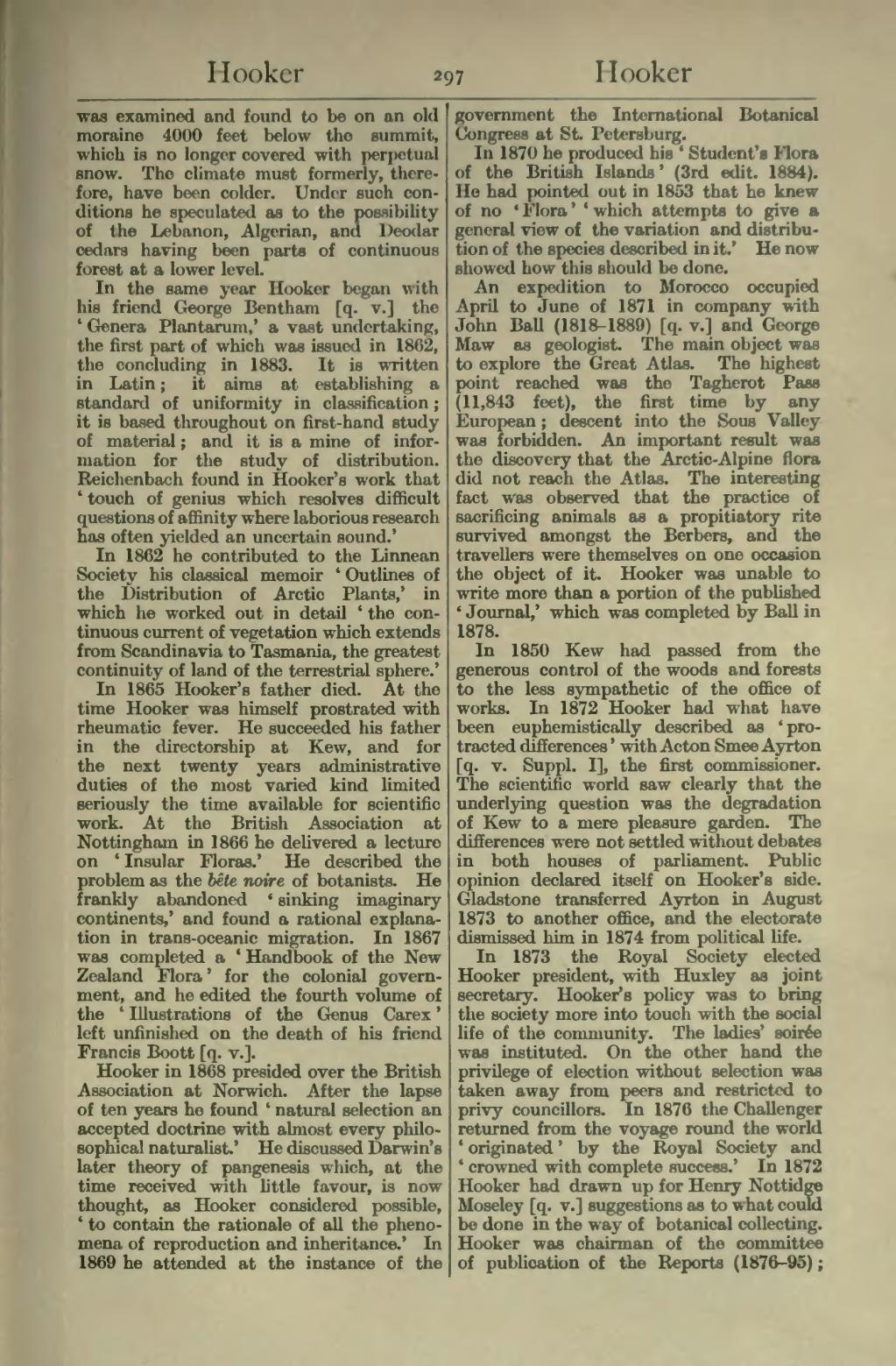was examined and found to be on an old moraine 4000 feet below the summit, which is no longer covered with perpetual snow. The climate must formerly, therefore, have been colder. Under such conditions he speculated as to the possibility of the Lebanon, Algerian, and Deodar cedars having been parts of continuous forest at a lower level.
In the same year Hooker began with his friend George Bentham [q. v.] the 'Genera Plantarum,' a vast undertaking, the first part of which was issued in 1862, the concluding in 1883. It is written in Latin; it aims at establishing a standard of uniformity in classification; it is based throughout on first-hand study of material; and it is a mine of information for the study of distribution. Reichenbach found in Hooker's work that 'touch of genius which resolves difficult questions of affinity where laborious research has often yielded an uncertain sound.'
In 1862 he contributed to the Linnean Society his classical memoir 'Outlines of the Distribution of Arctic Plants,' in which he worked out in detail 'the continuous current of vegetation which extends from Scandinavia to Tasmania, the greatest continuity of land of the terrestrial sphere.'
In 1865 Hooker's father died. At the time Hooker was himself prostrated with rheumatic fever. He succeeded his father in the directorship at Kew, and for the next twenty years administrative duties of the most varied kind limited seriously the time available for scientific work. At the British Association at Nottingham in 1866 he delivered a lecture on 'Insular Floras.' He described the problem as the bete noire of botanists. He frankly abandoned 'sinking imaginary continents,' and found a rational explanation in trans-oeanic migration. In 1867 was completed a ' Handbook of the New Zealand Flora' for the colonial government, and he edited the fourth volume of the 'Illustrations of the Genus Carex' left unfinished on the death of his friend Francis Boott [q. v.].
Hooker in 1868 presided over the British Association at Norwich. After the lapse of ten years he found 'natural selection an accepted doctrine with almost every philosophical naturalist.' He discussed Danvin's later theory of pangenesis which, at the time received with little favour, is now thought, as Hooker considered possible, 'to contain the rationale of all the phenomena of reproduction and inheritance.' In 1869 he attended at the instance of the government the International Botanical Congress at St. Petersburg.
In 1870 he produced his 'Student's Flora of the British Islands' (3rd edit. 1884). He had pointed out in 1853 that he knew of no 'Flora' 'which attempts to give a general view of the variation and distribution of the species described in it.' He now showed how this should be done.
An expedition to Morocco occupied April to June of 1871 in company with John Ball (1818-1889) [q. v.] and George Maw OS geologist. The main object was to explore the Great Atlas. The highest point reached was the Tagherot Pass (11,843 feet), the first time by any European; descent into the Sous Valley was forbidden. An important result was the discovery that the Arctic-Alpine flora did not reach the Atlas. The interesting fact was observed that the practice of sacrificing animals as a propitiatory rite survived amongst the Berbers, and the travellers were themselves on one occasion the object of it. Hooker was unable to write more than a portion of the published 'Journal,' which was completed by Ball in 1878.
In 1850 Kew had passed from the generous control of the woods and forests to the less sympathetic of the office of works. In 1872 Hooker had what have been euphemistically described as 'protracted differences' with Acton Smee Ayrton [q. v. Suppl. I], the first commissioner. The scientific world saw clearly that the underlying question was the degradation of Kew to a mere pleasure garden. The differences were not settled without debates in both houses of parliament. Public opinion declared itself on Hooker's side. Gladstone transferred Ayrton in August 1873 to another office, and the electorate dismissed him in 1874 from political life.
In 1873 the Royal Society elected Hooker president, with Huxley as joint secretary. Hooker's policy was to bring the society more into touch with the social life of the community. The ladies' soiree was instituted. On the other hand the privilege of election without selection was taken away from peers and restricted to privy councillors. In 1876 the Challenger returned from the voyage round the world 'originated' by the Royal Society and 'crowned with complete success.' In 1872 Hooker had drawn up for Henry Nottidge Moseley [q. v.] suggestions as to what could be done in the way of botanical collecting. Hooker was chairman of the committee of publication of the Reports (1876-95);
